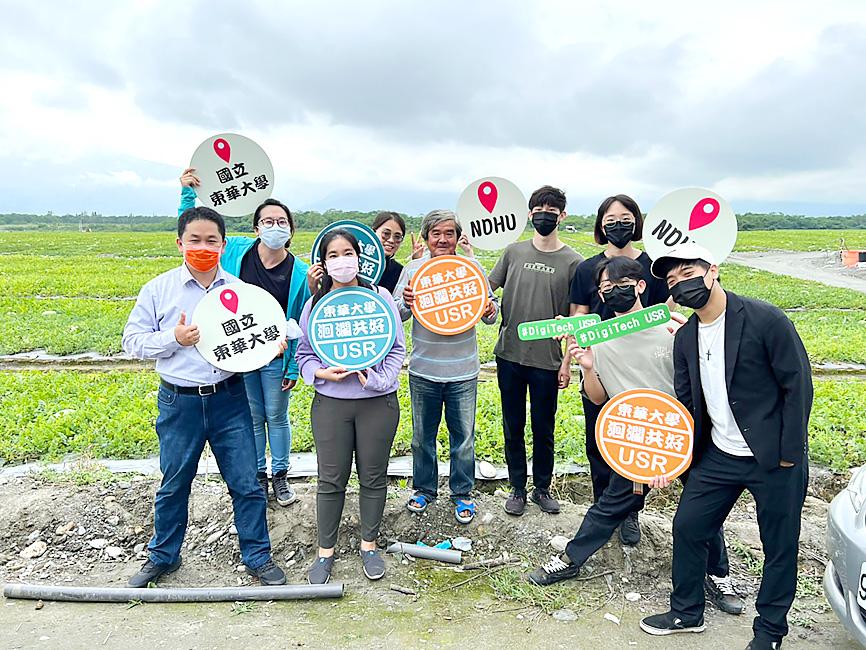A team from National Dong Hwa University (NDHU) has developed a solar-powered infrared “invisible” fencing system to help farmers in Hualien County prevent theft of their crops.
Initiated as a project by the university’s Energy Technology Center, the infrared system establishes a detection fence that is not visible to the naked eye, removing the unsightliness of physical fences. The system sounds an alarm when trespassers are detected, while a mobile app alerts farmers and notifies local police of the intrusion.
Using solar power, the system does not add to energy costs.

Photo courtesy of NDHU via CNA
Pai Yi-hao (白益豪), an associate professor at the university and director of the technology center, said the team began working on the project earlier this year.
Professors and students at the technology center engineered the system’s infrared sensors and the electronic transmitters, along with the waterproof shell that houses the intricate electronics.
The team also ensured that the solar power design was stable, and that farmers could use the Line app to receive alerts and notifications, Pai said.
The project was not without setbacks. In one of its first installations, in a Hualien watermelon field, the system’s signal was weak and unstable due to the area’s geography. Chunghwa Telecom stepped in to help by boosting its signal strength, Pai said.
NDHU’s University Social Responsibility Office, which is in charge of the school’s social outreach program in Hualien, selected several watermelon farms covering about 40 hectares for the technology.
The farms were selected for having sufficient exposure to sunlight, creating optimal conditions for solar power collection, the office said.
Local farmers who were presented with the technology said they were grateful that they would not have to be so anxious about theft from their fields at night, it said.

ANOTHER EMERGES: The CWA yesterday said this year’s fourth storm of the typhoon season had formed in the South China Sea, but was not expected to affect Taiwan Tropical Storm Gaemi has intensified slightly as it heads toward Taiwan, where it is expected to affect the country in the coming days, the Central Weather Administration (CWA) said yesterday. As of 8am yesterday, the 120km-radius storm was 800km southeast of Oluanpi (鵝鑾鼻), Taiwan’s southernmost tip, moving at 9kph northwest, the agency said. A sea warning for Gaemi could be issued tonight at the earliest, it said, adding that the storm is projected to be closest to Taiwan on Wednesday or Thursday. Gaemi’s potential effect on Taiwan remains unclear, as that would depend on its direction, radius and intensity, forecasters said. Former Weather Forecast

As COVID-19 cases in Japan have been increasing for 10 consecutive weeks, people should get vaccinated before visiting the nation, the Centers for Disease Control (CDC) said. The centers reported 773 hospitalizations and 124 deaths related to COVID-19 in Taiwan last week. CDC Epidemic Intelligence Center Director Guo Hung-wei (郭宏偉) on Tuesday said the number of weekly COVID-19 cases reported in Japan has been increasing since mid-May and surpassed 55,000 cases from July 8 to July 14. The average number of COVID-19 patients at Japan’s healthcare facilities that week was also 1.39 times that of the week before and KP.3 is the dominant

The Chinese Communist Party’s (CCP) working group for Taiwan-related policies is likely to be upgraded to a committee-level body, a report commissioned by the Mainland Affairs Council (MAC) said. As Chinese President Xi Jinping (習近平) is increasingly likely to upgrade the CCP’s Central Leading Group for Taiwan Affairs, Taiwanese authorities should prepare by researching Xi and the CCP, the report said. At the third plenary session of the 20th Central Committee of the CCP, which ended on Thursday last week, the party set a target of 2029 for the completion of some tasks, meaning that Xi is likely preparing to

US-CHINA TRADE DISPUTE: Despite Beijing’s offer of preferential treatment, the lure of China has dimmed as Taiwanese and international investors move out Japan and the US have become the favored destinations for Taiwanese graduates as China’s attraction has waned over the years, the Ministry of Labor said. According to the ministry’s latest income and employment advisory published this month, 3,215 Taiwanese university graduates from the class of 2020 went to Japan, surpassing for the first time the 2,881 graduates who went to China. A total of 2,300 graduates from the class of 2021 went to the US, compared with the 2,262 who went to China, the document showed. The trend continued for the class of 2023, of whom 1,460 went to Japan, 1,334 went to